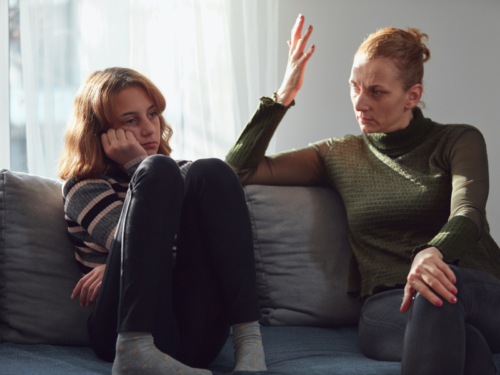
Table of Contents
Emotional Incest Doesn’t Mean What You Think It Means

Written By: Ashley Laderer

Clinically Reviewed By: Dr. Don Gasparini
January 25, 2024
8 min.
You’ve probably heard of sexual incest, but what about emotional incest? Learn more about this lesser-known form of emotional abuse here.
Learn more about our Clinical Review Process
Table of Contents
Do you feel like your parent’s emotional support person more than you feel like their child? Are healthy emotional boundaries nonexistent between you and your parent? If so, you might be experiencing emotional incest, which is a complex and often overlooked aspect of dysfunctional family dynamics.
Emotional incest (sometimes referred to as covert incest) is a form of emotional abuse inflicted on a child by a parent or primary caregiver, says Kathleen Douglass, MA, LCPC, a Primary Therapist at Charlie Health. This form of abuse is typically harder to recognize compared to other forms of abuse, such as overt incest, sexual abuse, or physical abuse.
It’s crucial to recognize the signs of emotional incest in adults and children to catch the behavior in its tracks and, ultimately, to heal from the effects of it. Read on to learn more.

You can heal from childhood trauma
Learn more about Charlie Health’s virtual, trauma-informed therapy.
What is emotional incest?
“Emotional incest is when a parent or primary caregiver treats a child like a romantic partner,” says Douglass. “The parent relies on the child to get their own emotional needs met that would normally be fulfilled by an adult partner.” The relationship is not physically or sexually intimate in nature, but it is inappropriate and unfair to the child, nonetheless.
When a parent or caregiver engages in covert incest, boundaries are blurred or non-existent. This is known as enmeshment. The child is placed in a mature emotional role, and they become the primary emotional support for their caregiver, Douglass says. They might feel like a parent themselves, taking care of their parent’s needs all the time. This is referred to as emotional parentification.
Of course, it’s okay for a parent to open up to a child and share feelings to some extent. However, emotional incest behavior goes far beyond what’s normal or appropriate since the topics discussed are not age-appropriate for a child. These conversations can put a child in a very uncomfortable position.
Examples of emotional incest
Emotional incest can present in many different ways. The overarching theme is crossing boundaries of what’s normal and acceptable for a parent-child relationship. “Essentially, in an emotionally incestuous relationship, the caregiver’s needs must always come first,” Douglass says. “If the child attempts to do anything that detracts from that, it places them in a very uncomfortable position, and the parent often makes the child feel guilty.”
Douglass says some examples of emotional incest in a family dynamic are:
- When a parent overshares details of romantic relationships with a child
- When a parent discusses marital troubles in detail with a child
- When a parent puts their own emotional needs before a child’s emotional needs
- When a child is forced to give up age-appropriate activities so they can be present for their parent
- When a parent is jealous of their child’s friends or anything else that occupies the child’s attention
- When a parent doesn’t give the child privacy or their own space
- When a parent vents to a child about trouble at work
- When a parent makes the child feel guilty if they aren’t complying 100%
Why do people engage in emotional incest?
“Unlike other forms of abuse, this may not always be intentional,” says Douglass. “The causes of this are not necessarily sinister or even something that a primary caregiver may be aware of.” Some examples of what might cause a parent to engage in emotional incest are as follows.
Unresolved mental health struggles
A parent with significant depression may end up turning to their child for emotional support, Douglass says. Unresolved abandonment trauma can also contribute. “Perhaps they have felt abandoned in the past. A child is sort of a captive audience, and the threat of abandonment is not an issue if they become emotionally dependent on a child,” says Douglass.
Unhealthy boundaries
There are many reasons why an adult might lack healthy boundaries. This could come from having poor role models –– maybe they were even victims of emotional incest growing up –– or they have poor self-care in general, Douglass says.
Distrust
“Often parents who engage in emotional incest have some issue in their own past that causes them not to trust other adults,” says Douglass. This could be due to getting abused or hurt in the past or having a history of unhealthy, unstable relationships.
Insufficient support system
A parent may turn to a child for emotional support if they don’t have any adults in their support system, and that’s why they turn to their kid, says Douglass. Or, they may be going through a divorce where they’ve lost their primary partner or main adult relationship and feel like they don’t have anyone else to turn to other than their child.
What are the consequences of emotional incest for a child?
The impacts of emotional incest can be significant and long-lasting. This form of emotional abuse can take a toll on a child’s development, mental health, and relationships. Douglass says some examples of mental health effects of covert incest include:
- Lacking the opportunity to develop healthy emotional boundaries
- Impaired sense of safety since they feel so responsible for their parent’s emotional stability
- The child doesn’t have space to simply just be a kid
- Inability to recognize their own emotional needs
- Inability to care for their own emotional needs
- Feeling guilt for having their own needs
- Struggling with making decisions
- Trouble separating themselves from their parent and the parent’s needs
- Low self-esteem
- Higher risk of anxiety and depression
These mental health effects don’t just stop in childhood. Douglass says all of these issues are easily carried into adulthood if not addressed. As children grow up, the patterns that were established in their formative years may persist. This can impact how they navigate romantic, friendship, family, or professional relationships. The difficulty or inability to set healthy emotional boundaries can create many struggles within interpersonal relationships.
Not to mention, emotional incest usually causes someone to develop an anxious attachment style, Douglass says. Anxious attachment styles are often linked with low self-worth, and they may cause someone to struggle with intimate relationships and feel an extreme sense of responsibility for the well-being of their romantic partner. This is due to learned behavior growing up.

However, the good news is that with awareness and a commitment to personal growth, victims can break free and move on from the impacts of emotional incest.
Emotional incest and other types of abuse
Covert incest can occur on its own, but often, other forms of abuse are present. For example, neglect is also common among parents who engage in emotional incest. Douglass says when a parent and their needs are the center of attention, a child’s needs fall to the side and can be neglected. Neglect is when a parent does not meet a child’s needs –– whether that’s emotional needs or physical needs.
Other emotional abuse can come into play, too. For example, a parent may threaten their child or withhold love from them. These behaviors both fall under the umbrella of emotional abuse.
Furthermore, it is possible that a parent engaging in emotional incest can also engage in physical abuse or sexual abuse. However, according to the Childhood Emotional Incest Scale (CEIS), neglect and emotional abuse are the most common co-occurring forms.
Those who have experienced neglect and other forms of abuse are at higher risk for developing complex post-traumatic stress disorder (C-PTSD), Douglass says.
Therapy for victims of emotional incest
Therapy can be life-changing for someone who is or was a victim of emotional incest. It provides a safe and supportive environment to explore deeply rooted struggles and develop healthier coping mechanisms.
If you’re a victim, it’s never too late to rewrite your story. You can learn to become resilient, build your self-worth, establish healthy emotional boundaries, and have healthy relationships. The journey towards healing involves not only understanding the lingering effects and impact of emotional incest but also actively working to reshape your perceptions, beliefs, and behaviors.
Douglass says a therapy modality called cognitive-behavioral therapy is especially helpful for survivors of emotional incest. CBT can help people restructure their thought patterns and break free from the negative cycles that emotional incest engrained in their minds. Essentially, CBT is based on the premise that our thoughts, feelings, and behaviors are interconnected.
With the guidance of a CBT therapist, survivors of emotional incest will learn to identify and reframe distorted negative thoughts that are associated with guilt, responsibility, and self-worth. In turn, you can develop healthier thought patterns.
When you address these cognitive distortions or unhealthy thoughts, you can learn new, healthier ways to behave and respond to certain situations. You will build a valuable coping toolkit that will help you navigate relationships and life stressors with a newfound sense of independence and resilience.

One of the most important things an emotional incest victim can learn in therapy is how to set healthy boundaries, says Douglass. This will ensure that relationships are safe, appropriate, and do less harm to mental health. Boundary-setting skills will benefit all types of relationships, not just the family dynamic.
Additionally, Douglass says family therapy, including the perpetrator of emotional incest, will benefit everyone involved. A therapist will educate the parent on what a healthy relationship looks like between a parent and child. This way, the parent can become self-aware and understand why their behavior is problematic. They will also learn how to respect boundaries and communicate in a safer and more effective way.
How Charlie Health can help
If you struggle with a mental health condition, Charlie Health is here to help. Charlie Health’s virtual Intensive Outpatient Program (IOP) provides more than once-weekly mental health treatment for teens and adults dealing with complex mental health conditions, including struggles that may have been caused by emotional incest.
Our clinicians use a variety of evidence-based therapy modalities in individual therapy, group sessions, and family therapy. You will also connect with peers who deal with similar struggles to help you remember that you are not alone.
Fill out the form below or give us a call to start your healing journey today.




